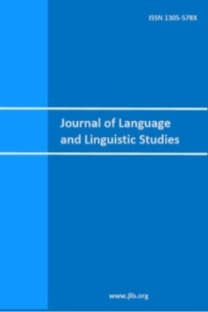Conceptual Socialization in EFL Contexts: A Case Study on Turkish EFL Learners’ Request Speech Acts Realization
Öz
Please fill up the following information accurately. (Please
use Times New Roman, 12 pt.
Conceptual Socialization in EFL Contexts: A Case Study on Turkish EFL Learners’ Request Speech Acts Realization
Anahtar Kelimeler:
Conceptual socialization, request speech acts, pragmatic competence; sociolinguistics
___
Alver-Yucel, O. (2017). The effects of viewing pre-selected video clips on low level Turkish EFL learners’ use of speech acts. (Unpublished master's thesis), Bilkent University, Ankara.Aliakbari, M., & Gheitasi, M. (2014). On Iranian EFL learners’ pragmatic competence and appropriate use of “request” in English context. Pan-Pacific Association of Applied Linguistics, 18(1), 19-31.
Bardovi-Harlig, K., & Hartford, B. (1993). Learning the rules of academic talk: A longitudinal study of pragmatic change. Studies in Second Language Acquisition 15, 279–304.
Bikmen, A., & Marti, L. (2013). A study of complaint speech acts in Turkish learners of English. Egitim ve Bilim (Education and Science), 38(170), 253-265.
Blum-Kulka, S. (1982). Learning to say what you mean in a second language: a study of the speech act performance of Hebrew second language learners. Applied Linguistics, 3(1), 29-59.
Blum-Kulka, S., & Olshtain, E. (1984). Requests and apologies: A cross-cultural study of speech act realization patterns (CCSARP). Applied Linguistics, 5(3), 196-213. doi:http://dx.doi.org/10.1093/applin/5.3.196.
Cohen, A. D. (1996). Speech acts. In S. L. McKay & N. H. Hornberger (Eds.), Sociolinguistics and language teaching (pp. 383-420). New York, NY: Cambridge University Press.
Cohen, A. D. (2004). Assessing speech acts in a second language. In D. Boxer & A. D. Cohen (Eds.), Studying speaking to inform second language learning (pp. 302-327). Clevedon: Multilingual Matters.
Ellis, R. (1992). Learning to communicate in the classroom: A study of two learners’ requests. Studies in Second Language Acquisition, 14, 1–23.
Istifci, I. (2009). The use of apologies by EFL learners. English Language Teaching, 2(3), 15-25. http://dx.doi.org/10.5539/elt.v2n3p15.
Kasper, G. (1992). Pragmatic transfer. Second Language Research, 8(3), 203–231.
Kecskes, I. & Papp, T. (2000). Foreign language and mother tongue. Mahwah, NJ: Lawrence Erlbaum.
Kecskes, I. (2002). Situation-bound utterances in L1 and L2. Berlin; New York: Mouton de Gruyter.
Kecskes, I. (2015). How does pragmatic competence develop in bilinguals? International Journal of Multilingualism, doi: 10.1080/14790718.2015.1071018.
Kılıçkaya, F. (2010). The pragmatic knowledge of Turkish EFL students in using certain request strategies. University of Gaziantep Journal of Social Sciences, 9(1), 185-201.
Lee, C. (2004). Written requests in emails sent by adult Chinese learners of English. Language, Culture, and Curriculum, 17(1), 58–72.
Leung, S. (2001). Language socialization: Themes and advances in research. Working Papers in TESOL & Applied Linguistics, 1(1), 1–18.
Li, R., Raja Suleiman, R. & Sazalie, A. (2015). An Investigation into Chinese EFL Learners’ Pragmatic Competence. GEMA Online Journal of Language Studies, 15(2), 101-118.
Lu, D. (2001). Cultural features in speech acts: A Sino-American comparison. Language, Culture and Curriculum, 14(3), 214-23.
Matsumura, S. (2001). Learning the rules for offering advice: A quantitative approach to second language socialization. Language Learning, 51(4), 635-679.
Ming-Fang Lin. (2014). An interlanguage pragmatic study on Chinese EFL learners' refusal: Perception and performance. Journal of Language Teaching & Research, 5(3), 642-653. doi:10.4304/jltr.5.3.642-653.
Mızıkacı, F. (1991). A sociocultural investigation of speech acts (requests and apologies) in Turkish and English. (Unpublished master's thesis), Bilkent University, Ankara.
Ortactepe, D. (2012). The development of conceptual socialization in international students: A language socialization perspective on conceptual fluency and social identity (advances in pragmatics and discourse analysis). Cambridge: Cambridge Scholars Publishing.
Pinto, D., & Raschio, R. (2007). A comparative study of requests in heritage speaker Spanish, L1 Spanish, and L1 English. International Journal of Bilingualism, 11(2), 135-155.
Rose, K. (1994). On the validity of the discourse completion task in non-western contexts. Applied Linguistics, 15(1), 1-14.
Schieffelin, B. B., & Ochs, E. (1986). Language socialization across cultures. New York: Cambridge University Press.
Siebold, K., & Busch, H. (2015). (No) need for clarity – facework in Spanish and German refusals. Journal of Pragmatics, 75, 53-68. doi:10.1016/j.pragma.2014.10.006.
Taguchi, N. (2015). Instructed pragmatics at a glance: Where instructional studies were, are, and should be going. Language Teaching, 48(1), 1-50. http://dx.doi.org/10.1017/s0261444814000263.
Taguchi, N. (2012). Context, individual differences and pragmatic competence. Bristol: Multilingual Matters.
Taguchi, N. (2011). Pragmatic development as a dynamic, complex process: General patterns and case histories. The Modern Language Journal, 95(4), 605-627.
Wierzbicka, A. (1991). Cross-cultural pragmatics: The semantics of human interaction. Berlin: Mouton de Gruyter.
Willett, J. (1995). Becoming first graders in an L2: An ethnographic study of L2 socialization. TESOL Quarterly, 32, 757–761.
Yule, G. (1996). Pragmatics. Oxford: Oxford University Press.
Zeyrek, D. (2001). Politeness in Turkish and its Linguistic Manifestations. In A. Bayraktaroğlu & M. Sifianou. Linguistic politeness across boundaries. (pp. 43-73). Amsterdam: J. Benjamins Pub. Co.
- ISSN: 1305-578X
- Yayın Aralığı: Yılda 4 Sayı
- Yayıncı: Hacettepe Üniversitesi
Sayıdaki Diğer Makaleler
Mehdi SOLHİ ANDARAB, Aynur KESEN MUTLU
Students’ attitudes towards blended language courses: A case study
Hatice KARAASLAN, Nurseven KILIÇ
Sevdeğer ÇEÇEN, Hande SERDAR TÜLÜCE
Effects of different reading texts on vocabulary gain, use and retention
Hatice Okyar, Abdulhamit Çakır
English as medium of instruction and international posture: From the perspective of students
